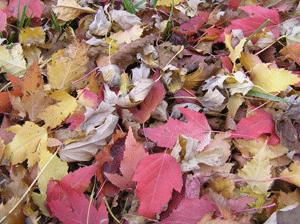Freezing temperatures are ending the growing season and its time to do yard and garden cleanup to help reduce overwintering diseases and insects; and to reduce the amount of plant debris washed into streams, lakes, and ponds where they contribute to water pollution.
Why Make Use of Tree Leaves? Fallen tree leaves, and grass clippings, are an important source of organic matter. As this yard waste decomposes, phosphorous and nitrogen is released. This is beneficial if decomposition is taking place in a compost pile or garden bed. If decomposition is taking place in water, an overload will contribute to impaired water ecology, such as excess algal growth.
To reduce the pollutant load on surface water, do not dump tree leaves or grass clippings along stream banks or near ponds where rainfall and snow melt can carry them into the water. Instead, compost leaves and grass clippings, use them as mulch, or till them into garden soil during fall.
Mowing Leaves into Turfgrass For healthy lawns, mow or remove tree leaves from lawns on a regular basis. Tree leaves can be mowed and left on the lawn if a sharp mower blade that finely chops leaves is used. The rule of thumb is if the un-mowed leaf layer is one inch or less thick, it’s okay to mow and not bag leaves. After mowing, the mowed leaf layer should not be thick enough to mat and suffocate grass.
Leaves can be removed by raking, mowing, or with a leaf blower/vacuum. When removed from lawns, they can be placed in compost piles now or some can be saved for use in compost next summer.
Composting Leaves When dry, fall leaves can be saved in plastic bags to use as a source of carbon, brown plant material, in compost piles during next years’ growing season when mostly nitrogen, green plant material, is only available. For effective composting, the correct ratio of carbon to nitrogen is needed.
Extension personnel are sometimes asked if there are any types of leaves that should not be used for compost. The answer to this question is basically no. According to research, leaves from different tree species decompose at different rates but the end product, compost, is the same.
It is recommended not to add diseased leaves to compost since most piles are not managed to reach temperatures hot enough to kill pathogens. However, many of the pathogens found on tree leaves are considered to be minor diseases that would not cause problems for gardens and minimal, if any problems, for trees when reused.
Leathery leaves such as oak leaves contain more lignin and therefore take longer to decompose. Leathery leaves are the best types to use as winter mulch over tender plants. The leaves can be held in place by placing a cage of chicken wire or hardware cloth around the plant/s and then filling the cage with coarse leaves. Be sure to wait until plants are dormant and the soil is frozen or has started to freeze before mulching plants for winter.
If leathery leaves are to be tilled into soil or added to compost piles, their decomposition can be sped up by shredding or mowing the leaves first. This provides more surface area for microorganisms to work on to speed decomposition.
Tree leaves are piling up outdoors. Help protect the health of lawns by removing heavy leaf layers. Protect tender plants over winter by using coarse tree leaves as mulch. Improve garden soils and compost by incorporating leaves into them. And help protect water resources by recycling this beneficial organic matter to reduce the amount that may end up in surface water.

